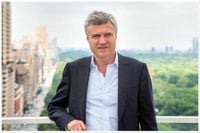Mark Read, the Chief Executive Officer of WPP, the UK-based advertising giant, has announced he will step down from his role at the end of 2025, concluding a remarkable career spanning over three decades with the company. The announcement, made on June 9, 2025, marks the end of a seven-year tenure as CEO during a period of significant transformation and challenge for the company.
Read’s journey with WPP began in 1989, with a brief hiatus before rejoining in 2002. He ascended to the CEO position in 2018, succeeding Sir Martin Sorrell, who resigned amid personal misconduct allegations. Over the past seven years, Read has overseen a sweeping overhaul of WPP’s operations, steering the company through a complex landscape marked by rapid technological change and evolving client demands.
During his leadership, Read pursued a strategy of simplification and consolidation within WPP. He orchestrated the merging or sunsetting of several major agency brands and facilitated the sale of a majority stake in the market research firm Kantar. These moves aimed to streamline the company’s internal structure and sharpen its focus on core competencies.
One of Read’s most ambitious initiatives was the aggressive investment in artificial intelligence (AI), committing approximately £300 million annually to develop AI tools and technologies. This strategy culminated in the recent full launch of WPP Open, an AI-powered platform designed to revolutionize marketing by harnessing data and automation. Last week, WPP unveiled Open Intelligence, touted as the industry’s first large marketing model (LMM), which aggregates multiple data points to move beyond traditional ID-based targeting.
Despite these forward-looking efforts, WPP’s financial performance under Read’s stewardship has faced headwinds. The company’s share price has plummeted by more than 50% since Read took the helm, dropping from a high of around £12 to £5.46 as of June 9, 2025. Following the announcement of his planned departure, shares fell an additional 2.1% in early trading.
The company has grappled with a series of high-profile client losses in recent years, including Coca-Cola’s North America media account, Starbucks’ US creative account, Volvo, Pfizer, and the severing of a two-decade-long relationship with Paramount. These account losses have contributed to a decline in revenue, with the first quarter of 2025 showing a 5% year-on-year decrease.
WPP’s position as the world’s largest advertising group has also been challenged. Last year, the company lost its top spot in global ad agency revenue to French rival Publicis Groupe. Meanwhile, competitors Omnicom and Interpublic announced a $13.3 billion merger, emphasizing the consolidation trend in the industry. WPP’s market value currently stands at approximately £5.9 billion.
Internally, Read’s leadership has not been without controversy. Earlier in 2025, he implemented a four-day return-to-office mandate, which met significant resistance from employees. Over 20,000 staff signed an online petition demanding the policy be revoked, highlighting tensions within the company’s workforce amid evolving work culture expectations.
Nevertheless, Read remains proud of the progress made under his watch. In his statement, he reflected, “WPP is an incredible company with over 100,000 talented and creative people, wonderful clients and partners, and an unmatched presence around the world. It has been an immense privilege to serve as its CEO for the past seven years.”
He emphasized the company’s creative strengths, noting that WPP was named Creative Company of the Year at Cannes Lions in 2024. “Our clients today rate us more highly than ever before, we now work with four of the world’s five most valuable companies, and our revenues with our biggest clients have grown consistently,” he said.
Read also highlighted the company’s AI leadership, stating, “We have positioned WPP at the forefront of the industry with our investments in AI and, with the full launch of WPP Open this year, we are now leading the way as AI transforms marketing.” He expressed confidence in the company’s future, citing an “exceptional leadership team and a secure financial position that allows us to face the future confidently and capture the opportunities ahead.”
Industry experts have offered mixed assessments of Read’s legacy. Media analyst Ian Whittaker suggested that Read’s contributions might be “more appreciated in time,” recognizing the complexity of transforming a company as vast as WPP. Chris Daly, chief executive at the Chartered Institute of Marketing, remarked on the mounting pressures from clients and competitors like Meta, which are leveraging AI to automate ad creation at unprecedented speeds.
Ramzi Chaabane, a global category manager at L’Oreal, interpreted Read’s departure as indicative of “something much bigger” happening in the marketing industry. “We’re entering the age of creative compute where value is measured in speed, precision, and impact. The good news is we are not just sourcing partners anymore, we’re designing the future of marketing,” he said.
As WPP begins the search for Read’s successor, speculation points to Brian Lesser, CEO of WPP Media (formerly GroupM), as a potential candidate. Lesser’s background in data and his leadership in developing WPP’s AI strategy position him as a strong contender to guide the company through its next chapter.
Philip Jansen, Chair of WPP, expressed gratitude for Read’s long service, stating, “On behalf of the Board, I would like to thank Mark for his contributions not only as CEO but throughout his more than 30 years of leadership and service to the Company.” Jansen confirmed that Read will continue to lead WPP until the end of 2025, focusing on executing the company’s growth strategy and ensuring a smooth transition to new leadership.
Mark Read’s departure closes a significant chapter for WPP, one marked by bold strategic shifts amidst a rapidly evolving advertising landscape. Whether his AI-driven vision will ultimately restore WPP’s former dominance remains to be seen, but his tenure undeniably set the stage for the company’s future in an era defined by technology and creativity intertwined.


